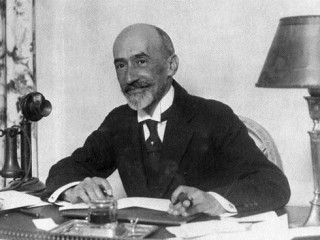
Jacinto Benavente biography
Date of birth : 1866-08-12
Date of death : 1954-07-14
Birthplace : Madrid, Spain
Nationality : Spanish
Category : Famous Figures
Last modified : 2011-07-04
Credited as : Dramatist, author and playwright, Teatro fantastico
Jacinto Benavente y Martinez was born in Madrid on Aug. 12, 1866, the youngest son of a prominent pediatrician. He grew up in an atmosphere of learning, wealth, and social ease. His father loved the theater, maintained a large library, and practiced among aristocratic families, writers, and actors. A precocious child, Benavente learned several languages by the age of 16 and delighted in visiting the circus and in performing plays for household servants and friends.
In 1882 he enrolled in the University of Madrid to study law but gave up his studies 2 years later when his father died. Benavente lived an easy, comfortable life. He dressed elegantly, attended fashionable parties, and became a part of the refined but decadent bourgeois society depicted in most of his plays. About 1890, before he had established his reputation as a playwright, he worked successfully as an actor and gained a firsthand knowledge of staging techniques, which he later applied to his own productions.
In 1892 Benavente published his first work, Teatro fantastico (Fantastic Theater), eight short sketches based on dreams and fantasies. The following year he wrote a volume of poetry, Versos, and the prose work Cartas de mujeres (Letters from Women), which attests to his insight into the behavior of women and to his preference for feminine protagonists. In almost all his plays the only really strong characters are women; the men usually remain shadowy and unconvincing.
In 1894 Benavente's first play, El nido ajeno (Another's Nest), was staged. Its dramatic technique represented a stunning contrast to the grandiloquent style of Jose Echegaray. Benavente replaced action with a skillful, ingenious dialogue and emphasized the social and moral climate of the play at the expense of plot conflict. Rather than exploring the traditional concept of honor, he centered the story in the thoughts and feelings of the feminine protagonist. While El nido ajeno received a mixed response, unqualified success came in 1896 with Gente conocida (Eminent People). Spanish audiences enthusiastically applauded Benavente's innovations, and from 1896 to 1907 he produced 53 plays. Among them were La gobernadora (1901; The Governor's Wife), an exposure of corrupt provincial politics; La noche del sabado (1903; Saturday Night), an allegorical play which combines novel and drama; Los malhechores del bien (1905; The Misdoers of Good), a biting satire on the arrogance and hypocrisy of certain "charitable" ladies; and Los intereses creados (1907; Profits Made), a pessimistic examination of human behavior, which is generally considered his masterpiece. In Los intereses creados the characters are puppets who act according to the dictates of self-interest, commingling noble impulses with base desires so that the former become necessarily tainted by the latter.
This play, together with La malquerida (1913; The Misbeloved), a rural tragedy in the classical manner about the love between a man and his stepdaughter, established Benavente's international reputation and won for him the Nobel Prize in 1922.
Ironically, Benavente's work declined in quality about the time the Nobel Prize was awarded. From 1920 to 1954 he produced nothing of merit, and today even his best plays are largely ignored by the Spanish public. This final decadence is due to the fact that although Benavente reformed the turn-of-the-century theater, he was not an authentic revolutionary. Primarily, he aimed to please his audience, Spain's rather complacent upper class, which had little knowledge or sympathy with the pressing economic or social problems. Consequently, Benavente produced a bland, conservative theater which, in contrast to the work of other Spanish writers of the Generation of 1898, avoided serious moral, religious, or social preoccupations. Thus it quickly became outmoded.
During the second broad period of his life (1920-1954) Benavente traveled extensively to Latin America, the United States, and the Soviet Union. From 1936 to 1939 during the Spanish Civil War, he lived in Valencia. Upon his return to Madrid he publically endorsed the Franco regime to the dismay of his former liberal acquaintances. He died on July 14, 1954, in Madrid at the age of 88, having written and staged 172 plays.
















